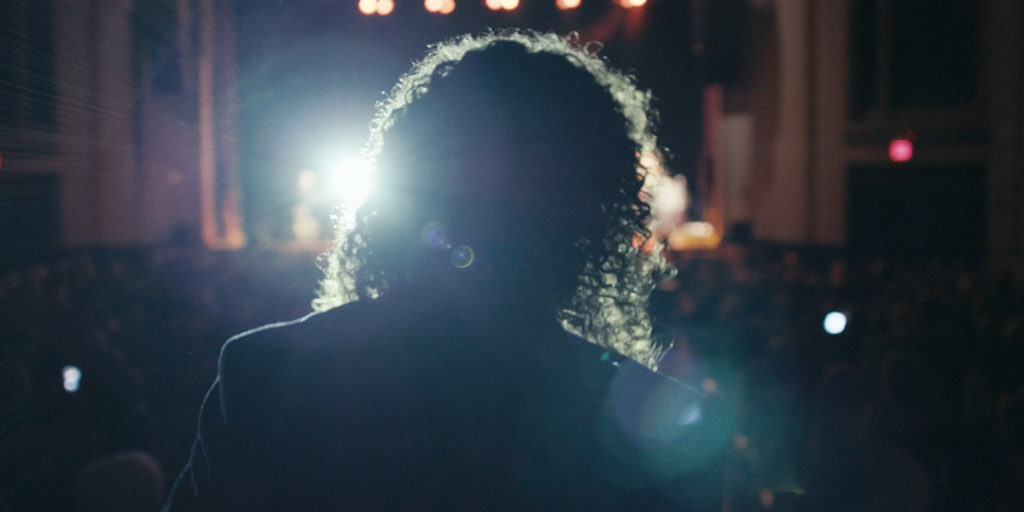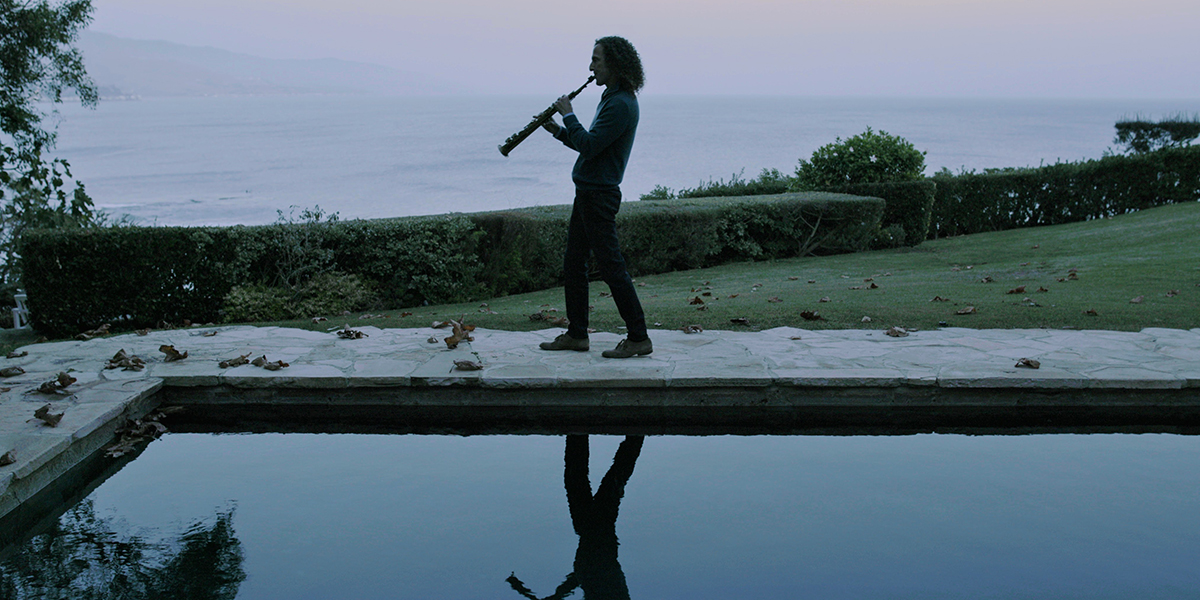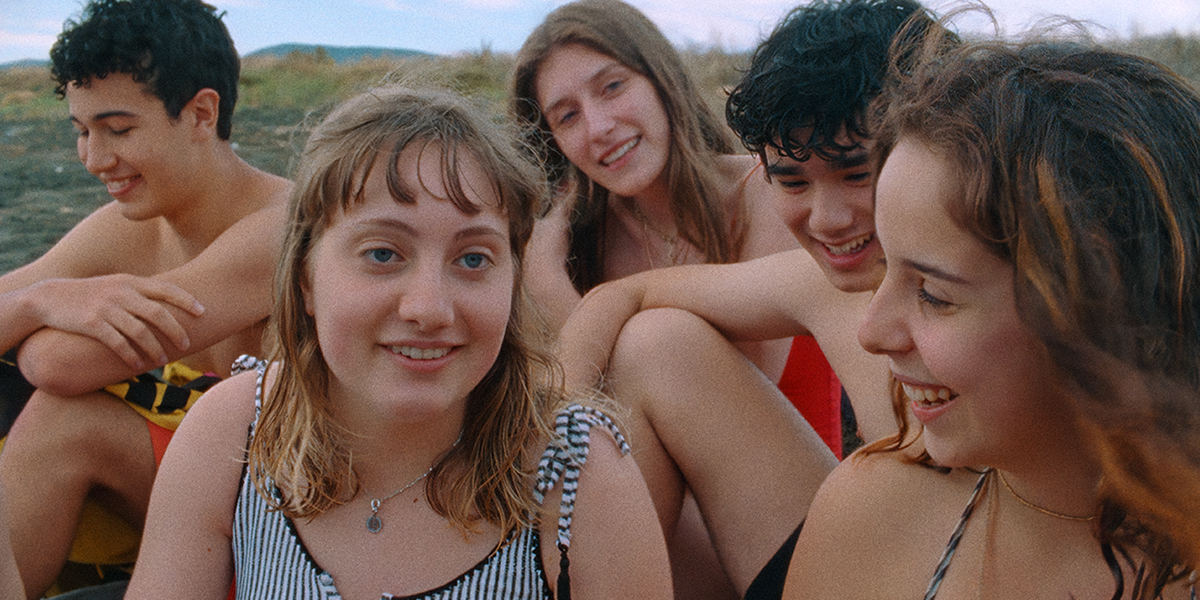For some, the soft cry of Kenny G’s soprano saxophone is romantic and soothing. It’s a salve for the soul that helps block out the turmoil of daily life while providing comfort and enjoyment. For others, Kenny G’s sound is an egregious caterwaul, a musical pabulum for the masses that takes elements of improvised live music colloquially known as jazz and creates a horrifying exemplar of commercialization and appropriation.
Filmmaker Penny Lane (Nuts, Hail Satan) effortlessly weaves a sense of playfulness and fun into a profound exploration as she turns her lens to the saxophonist and his career. Mixing interviews with music critics with an interview with the musician himself, Listening to Kenny G deftly contrasts the critics deriding his choices and the fans (including Kenny himself) who seem perfectly fine with simply enjoying their preferred musical tunes.
There’s so much to unpack here, far more so than the musical expression itself would suggest upon first listen. It is one of the absolute delights of Listening to Kenny G that music that’s so saccharine and superficial could engender a conversation so profound about the nature of popular art, the role of the artist in relation to the musical well from which he draws, and the need to confront prejudices about one’s own sensibilities.
POV spoke to Penny Lane by phone after the premiere of Listening to Kenny G at the 2021 Toronto International Film Festival.

POV: Jason Gorber
PL: Penny Lane
POV: I think you’re the perfect person to do this film by following an exposé on the Satanic Church with a look at Kenny G. How soon into the process did you know that it would be a hybrid between people who were immediately dismissive of the subject material and people who might have been gormless about his effect on the world of jazz?
PL: I’m in my 40s, so I came of age in the 1990s. That was the era where my musical identity was forming and in my teenage years, Kenny was ubiquitous. I wouldn’t say that I was a fan, it was just part of the world that I lived in. It was like being a fish in water. At the time, that was probably the height of the volume of a small number of people with very loud opinions about how terrible he was, how terrible his music was. I wasn’t part of that discourse, I wasn’t involved, but I noticed it. Flash forward a bunch of years, and Phil Simmons asked me to pitch him ideas for documentaries for this series he was putting together for HBO. I’m not crazy about most music documentaries, and I think one of the reasons is that there’s no conflict. There’s no point to them [laughs] most of the time.
POV: Have you seen that music documentary where they start out and they’re all friends, and then they all do a lot of drugs and then stop being friends, and then they break up and then they’re very sad and making less money than they were together and then they do a comeback 20 years later?
PL: [Laughs] Exactly! That’s often the only conflict they can come up with to structure a film around, which is fine, but it’s just not interesting to me. You know my work, you know me, that’s not how I make movies. So I was interested in coming up with an idea for a music documentary that would explore that conflict of what it means when one person says this music is great, and another person says this music is terrible. What do you do with that? What is that conflict really about? I thought of Kenny again because of when I came of age—people really talked about music differently then.
When I went back and looked at archival from the ’90s and early 2000s, music critics sound really snotty. They don’t really talk that way anymore. There’s much more of an understanding now that when you trash a really popular artist, you’re kind of trashing their fans, and it’s mean, snobby, and doesn’t do any good in the world. Kenny seemed like a good vessel for that conflict. But then I met him and the film evolved a lot afterwards. A big part of the project of the film was to try to accurately represent who he is as a person, and the specific story of his specific career and not just this idea of a conflict.
POV: Did you like his music more or less by the time you finished the project?
PL: More, I would say. I definitely have a very emotional response to a lot of his songs now because I spent so much time either being in an audience with people who are in love with that music and just seeing their response to it. You can see in the film a montage of people getting married to Kenny’s music, and I had that scene in my head from the very beginning. I cry every time I watch it. I have a very emotional response to that song in particular.
POV: Did making this film shape how you look at your own work? Has it mellowed your own aesthetic sensibilities?
PL: I think in a certain kind of way it has. It didn’t change my taste in art or anything, but I think it’s worthwhile for those of us who are passionate about art, whatever kind of art we’re passionate about, which for most people is mostly music, but for some of us, documentary films. It’s fine to have strong reactions to art, but it’s also very important to occasionally step back and remember that these are just opinions. These are not objective truths, we don’t have to convince somebody that we’re right and they’re wrong. Those are distractions from the real point of art, which is for the artist to make something to connect with another person. That’s what art is for. So there’s no question that Kenny’s done that. Kenny’s done that way more than I have or ever will in my life, that’s for sure.

POV: Your film’s found middle ground between an Aristotelian analysis of aesthetic ontology and a smooth sax soundtrack with people awkwardly clapping along. Both of these things happen at the same time.
PL: A good combination! [Laughs]
POV: I think your film actually does something incredibly important. I mean, you’re talking to a critic who obviously says whether I think something is good or bad on a regular basis, and thinks that in some ways, Kenny is committing a musical war crime. But what I think is clear here is that not one person in the film, including Kenny himself, loves this stuff ironically. You are trying to find not only empathy but also aesthetic connection with those who genuinely love his music, and then confronting your own reaction. Did you go through the same process?
PL: Yes, absolutely. That’s exactly what I’m talking about. And that’s what I wanted from the film. What I want is for my films to be challenged in a deep way. I want to learn something new, I want to be provoked, and I want to be pushed to grow and to evolve my thinking. That’s what I want for my audiences. I’m not the kind of artist who does that in a slash-and-burn kind of way and then make people cry. I try to do it with humor, because I think people relax and are more open to having their ideas challenged if they’re smiling. If you’re doing it with a smile on your face, they’re more likely to listen to you, anyway!
Absolutely it challenges me, and I hope it challenges the audience. It doesn’t really matter what you think about Kenny G’s music per se. I hope it raises that larger point, a little bit unsettling, about the opinions that you’re so certain are right. Not to sound too hippie-ish about it, but bringing people together is a nice thing, right? Looking for ways to bring people together is a nicer thing to do than find more ways to divide us.
POV: Here’s why your film gets incredibly complicated and why I think there’s a direct correlation to Hail Satan!. Your new film shows ostentatious critics reflect upon their own prejudices and their own constraints about who they are as individuals looking into something that’s popular. Equally, in a world where 50% of your country was oblivious to the fact that another 50% was going to vote a certain way, this film opens that up. You can still think something is wrong, and still engage and try to understand what they love about it. In this world of siloed information, does the homogenous landscape that made Kenny G a superstar directly impact your views of the current political divides?
PL: Oh, totally—that’s such a big topic. For me, it’s a really small number of people who feel , as you said earlier, that Kenny’s committed a war crime. I know that you feel that way, and I know that a lot of people I know feel that way, but we are the weird ones. We are the minority. And I think it’s important to stop and say what gives me the right to say that my opinion on this topic is more valid, or more important, or more accurate? Yeah, ok, maybe I went to art school.
POV: Or, the counter argument is that I have expertise, and that being popular doesn’t make something good, hence the grand paradox of democracy. When we stop listening to experts, things become a problem. Your film questions this point but doesn’t undercut it entirely and that’s what I found fascinating, like the best documentaries, it asks more questions than it answers.
PL: Well I’m glad you think that. I also think that the critics I chose are really smart, nuanced thinkers. They’re not people who believe the role of a critic is to tell you what’s good and what’s bad, the end. That’s really one of the least important roles of the critic, right? The critic is there to put things in context, to create interesting connections, to help people connect with the work in different ways and express their own opinions as well. I don’t think I would have made the film with critics who didn’t have nuanced points of view on it. They’re going to have a good time, and they’re going to kick Kenny around a little bit, but they’re also there to learn something and grow as well.
POV: Do you have a musical background?
PL: Oh no, none. I was lucky that I had a producer, Gabriel Sedgwick, who is a trained musician and crazy jazz head, so I really benefitted from his knowledge and his expertise. He was able to help me understand what people were saying and position Kenny in a history of jazz.
POV: Or, as he claims, “instrumental music.”
PL: Exactly. I possess zero knowledge of either of those things. I’m not a huge music person. I think that music is amazing, I also think that it’s magic. I’m like, “How does it work?” I don’t know.
POV: Does this make you appreciate why blockbusters are blockbusters in a different way? On the other hand, do you understand why people who are upset about the comic-ification of blockbuster cinema are quietly and elitistly upset?
PL: Oh, of course. And you can just put it in my own professional world. I have very strong opinions about documentaries and is it true that the most popular documentaries tend not to be my particular favourites? I have definitely gotten very worked up about that and yelled about it plenty of times. I’ll say as a side note that I did a ton of interviews with Kenny’s fans over Zoom because it was COVID and we weren’t able to tour, but I didn’t use them because they looked and sounded like crap. Who wants to look at zoom in a movie? But that research was really helpful because I was surprised and, in retrospect, shouldn’t have been, by how much people talk about how hard their lives are. Life is hard, and a lot of people are talking about loving this music because it helps them cope. If you extend that to Marvel movies or any other form, it does give you a baseline empathetic point of view.
POV: Give me a doc you love and a doc you know is a big deal and you don’t like.
PL: I can give you a really easy example, which is that there was a year where The Act of Killing was nominated for an Oscar, and for some people, that year was notable because it didn’t win. What did win was 20 Feet from Stardom, which is not the most egregious Oscar win in documentary history, by any stretch of the imagination. That’s a good film, it’s solid, whatever. But at that moment, I was furious. It’s like when Eliott Smith plays the Oscars and Celine Dion wins for Best Song. It’s a very similar feeling, when you want your thing to be the thing, but these are just apples and oranges, man. With 20 Feet From Stardom and The Act of Killing, to even put them in the same category is so laughable. The former is a profoundly disturbing, world changing event and the latter is a really good time. [Laughs]
POV: It’s possible that Morgan Neville 100% agrees with you. For the record, I love both of those films. I only get angry at films like Blackfish, which is so popular because of a whole bunch of people too stupid to realize that fish in a zoo are in a zoo. Or that My Octopus Teacher about a guy flirting with a cephalopod takes home the top trophy. But there we are, there’s part of my private grudge list that makes me angry.
PL: I appreciate that!












